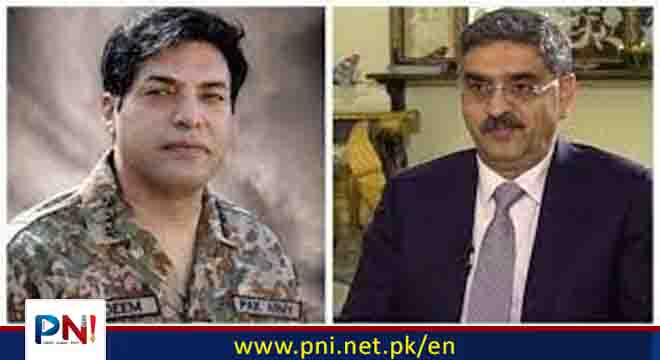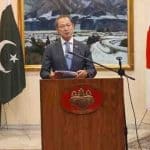ISLAMABAD Nov 10 (Online): Caretaker Prime Minister (PM) has extended the Director General Intern Services Intelligence (DGISI) Nadem Anjum’s term for an year.
Term extension purposes to bring continuity of policies, PM, on Arab News’ question why Anjum was given an extension?, defended the extension
He also said military and government wanted to continue Anjum to implement the policies but he didn’t disclosed any specific details of policies.
Prime Minister first time commented on the extension although military has not announced extension formally.
The DG ISI is one of the most important positions in Pakistan, operating at the intersection of national politics and foreign relations. The agency oversees efforts to combat militants and is also feared by civilian politicians for its role in past military coups and managing political affairs.
PM granted extension amid the major up rise in attacks of militancy groups like Daesh, TTP.
Pakistan blamed Afghan Taliban coming in power in Afghanistan which caused the increase in terrorism attacks in Pakistan.
Anjum was appointed DG ISI on November 20, 2022. Little over a week later, the TTP said it would no longer abide by a months-long cease-fire with the Pakistani government, urging its fighters to resume attacks against a continuous military campaign against them. Since then, the group has launched attacks on police compounds, security convoys and other military and civilian targets.
In preview of election that has been announced and political rallies and campaigns are taking place on which Caretaker PM also said that He and the government did not want to link rise in militancy to a possible delay in the election. Militants keep on changing their tactics, we have to respond accordingly.
Responding to allegations by the PTI of a widespread crackdown against the party, and by Khan that over 100 legal cases against him were politically motivated, the PM said all parties had the right to seek remedies through courts.
Khan, like Sharif, is also disqualified from the election because of an August graft conviction, which he has appealed, he said.
“They should exhaust all the legal options if they are being legally barred from the electoral process,” the PM said.
When asked if he was prepared, as head of the caretaker government, to create a “level playing field” by suspending Khan’s sentence so he could contest elections, as the Punjab administration had done for Sharif, Kakar said:
“We will deliberate in that situation if it comes to that, we will deliberate that what are the options and what needs to be done and we will decide accordingly.”
Anwaar-ul-Haq Kakar has said Pakistan needs to engage with Western governments, particularly in the US and the UK, to convince Israel the war in Gaza could have a “spillover effect” beyond the Middle East, while also calling for introspection by Muslim countries.
“We need to engage with different Western capitals, particularly Washington and London, and they need to make realize, the Israeli side, that they are contributing to destabilizing not just the region, but (that) probably it would have a spillover effect beyond the region,” Kakar said in an exclusive interview with Arab News.
When asked if Pakistan’s government had received any requests from the US to soften its stance against Israel following its continued attacks on Gaza, Kakar said: “I’m not aware of any such request and I don’t think any government would listen to any such request, which is in my opinion surreal. It’s absurd to even think of requesting someone to be silent on such an account.”
Kakar has called for an immediate “cessation of violence” and labeled Israel’s assault on Gaza “genocide, clearly.”
He said he would be traveling to Riyadh at the weekend for an extraordinary session of the Organization of Islamic Cooperation (OIC) to discuss Israel’s attacks on Palestine.
He added that “You can’t just kill children and you have got the right to defend yourself. It’s the license to barbaric retaliation.”
When asked if Muslim nations were doing enough for Gaza, Kakar raised questions about the role of the world’s estimated 1.8 billion Muslims, who make up 24 percent of the global population, in “facing (up to) the kind of situation which we are in.”
He said: “We need to ask more deep questions from this entire … (Muslim) population: What kind of contribution globally are we having … toward science and technology? What kind of defense capabilities are these different 50 or 57 countries developing for themselves?”
Kakar blamed “governance structures” in Muslim nations, saying their challenges were “more deep than the mere quagmire of the Palestinian situation.”
He said the choices which we are making or we are forced to make are not probably in the interest of the larger group of 1.4 billion people, which we call Muslims.”
Follow the PNI Facebook page for the latest news and updates.









